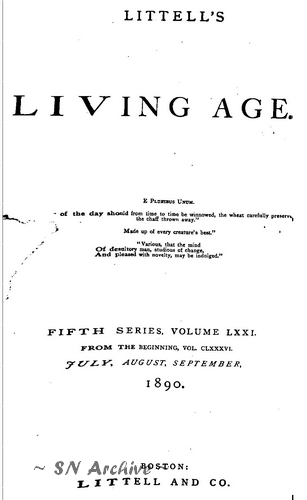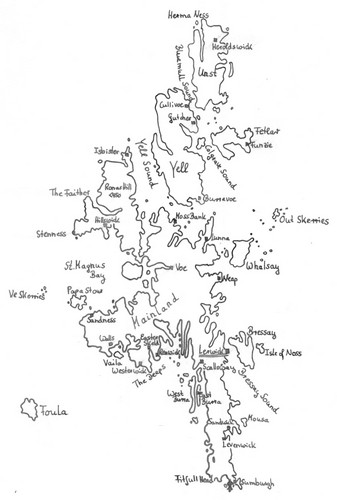 |
Littell's Living Age Fifth Series, Volume LXXI from the Beginning, Vol. CLXXXVI July, August, September 1890 (USA) (Digitized by Google) From the Contemporary Review. IV. The Shetland Isles In The Birds Nesting Season T. Digby Pigott |
Page 553: "... we found ourselves on a remote promontory in Shetland face to face with living examples of life, under circumstances which almost everywhere else in the British Islands have long since passed away.
The green of the turf at our feet was broken with patches of thrift and pink campion, and starred in all directions with dwarfed blue squills in full blossom. On the opposite side of the sound, to our left as we looked southwards, a mile or so off, lay the island of Mousa, with its almost perfect broch in full view. To our right lay a little land-locked bay, a perfect anchorage for a viking's boats, with deep water, still as a pond, though a stiff breeze was blowing, and boch open sea and sound were white with breakers. ... and on the mainland opposite, within twenty yards, stood a crofter's homestead, built with stones from the broch, not many degrees removed from the beehive huts, of which the outlines, and in more than one case the stone foundation walls, clustering round the castle, were still to be seen.
We leant against a corn tub with a roughly chipped disk of stone for lid, which might have passed muster in a museum as a relic of pre-historic day, and chatted with a kindly old lady, wearing 'revlins', the most primitive form of shoe known, made of untanned cowhide with the hair on, fitted to the foot ...'
We had surprised her by expressing a wish to see a quern in working order, and she took us through a gate, swinging on a stone socket, into an outhouse to see one belonging to her uncle and herself. The door was so low and the walls so thick that we had to stoop almost to 'all fours' to get in, and having done so, found ourselves in the dark until our hostess had found her stick - a precious possession where there is no native grown wood - and opend the shutter by knocking of a sod which covered the only window, a slit in the turf roof. The sun at the moment being clouded, and the light, even when the shutter was down, not very brilliant, our friend left us to fetch a lamp. We were quite prepared to see her return with a Sheltand 'collie' - ... - and were almost disappointed when, instead, she brought a contivance of scarcely less primitive design, not unlike a battered tin teapot with a twist of unspun wool in the spout for wick. In spite of the cloud of smoke it threw up, and the rather troublesome attentions of a small calf which had been shut up in the room to keep it from its mother, we were able by the light it gave to examine, underneath the wooden tray on legs, fastened to the wall, on which the grindstones were fixed, the simple but very effective contrivance* for regulating the coarseness of the meal to the ground. ...
*A full description of the mechanism of a quern, with illustrations, with much other interesting information with regard to the survival in Shetland of implements, etc., of patterns of very early date, will be found in the Rhind Lectures, delivered in 1876 an 1978, by Dr. A. Mitchell, prefessor of ancient history to the Royal Scottish Academy, quited above, published in 1880, under the title "The Past in the Present.' "
Page 558: "There is a herd of Shetland ponies on Mousa. They are kept for breeding purposes only, and lead a life as free as the mustangs of Mayne Reid's stories. All the mares, with a single exception, had, when we saw them, foals beside them, and were kept well in hand by their shaggy lord and master, who, when he thought we had looked long enough, gave the order to move off, and when one mare lingered behind the rest with a tiny foal not many days old, which skipped about like a lamb, and looked scarcely bigger, he cantered down and at once drove her up. The stallions' place as they move is last in the herd. The standard height for a Shetland pony is forty inches, and the present value of a fairly good one not taller, from £15 to £20. Many of them, poor little creatures, leave their island to spend the rest ot their lives in coal-mines; but there has lately been a considerable demand from America, and many now go there."
If you discover any errors in the text that may have been caused by the transcription, please let us know for a prompt correction.

